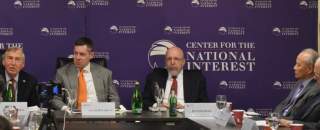America’s Nightmare: The Sino-Russian Entente
The most dangerous threat to America “would be a grand coalition of China and Russia, united not by ideology, but by complementary grievance.”
At the beginning of the discussion, Jacob Heilbrunn remarked that “Today, Donald Trump was described in a leading newspaper as ‘an infantile narcissist with an unstable mind and a detonator of chaos.’ No this was not the Washington Post or the New York Times, but a leading Moscow newspaper.” The relationship with Russia is at a post-Cold War nadir.
Due to candidate Donald Trump’s unorthodox foreign policy rhetoric on the campaign trail, there was speculation that he might re-orient U.S. foreign policy in a more realist direction, prioritizing relations with America’s two biggest major power competitors: China and Russia. Yet, two years into the Trump administration, relations with both countries have deteriorated considerably. There is widespread discussion in Washington of a “new cold war,” which many American pundits characterize as a struggle between democracy and authoritarianism.
How did a president that many saw as willing to take a more realist foreign policy approach, a key element of which would have been seeking to restore some equilibrium in the U.S.-China- Russia strategic triangle, end up presiding over simultaneous, ideologically charged confrontations with Moscow and Beijing? According to Simes, although Trump displayed some “realist impulses” as a candidate, as president, he is not interested in “systematic strategic thinking” and like his immediate predecessors, eschews serious strategic analysis. Regrettably, the costs of America’s inability to think strategically have been all too predictable, the foremost of which is an increasingly close alignment between Russia and China.
John S. Van Oudenaren is assistant director at the Center for the National Interest.

